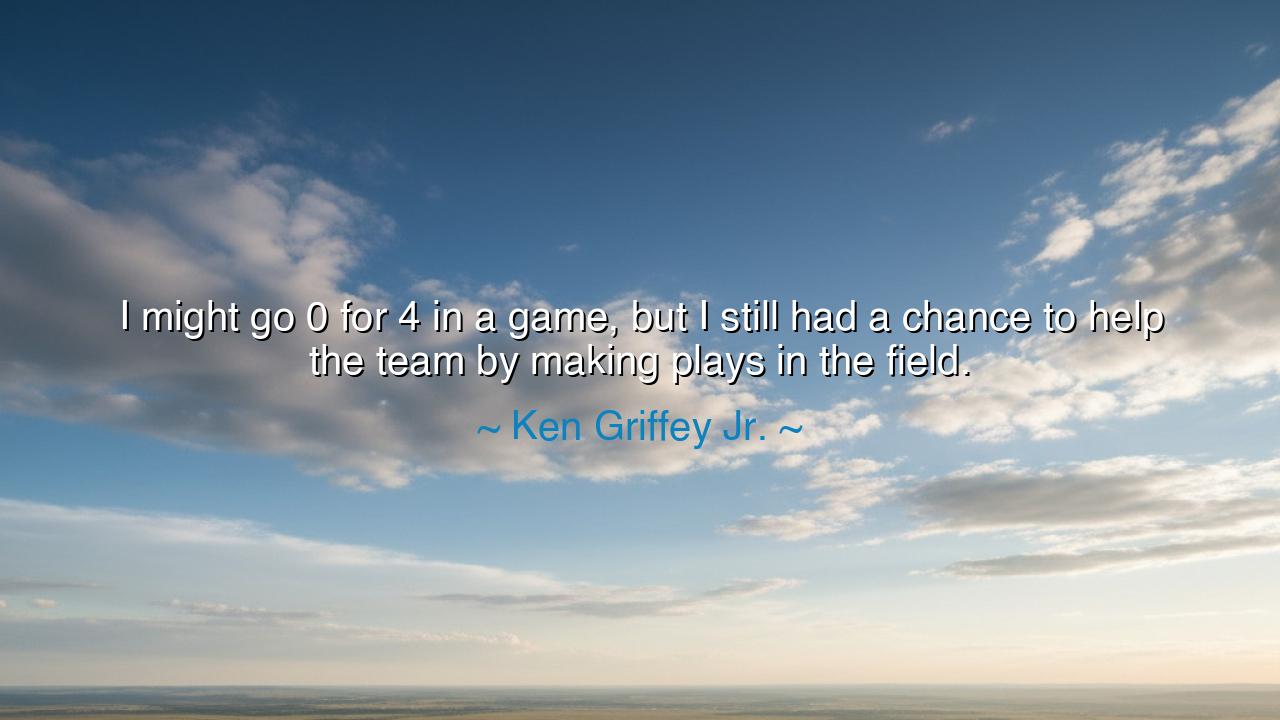
I might go 0 for 4 in a game, but I still had a chance to help
I might go 0 for 4 in a game, but I still had a chance to help the team by making plays in the field.






In the timeless pursuit of greatness, there is a profound truth that lies in Ken Griffey Jr.'s words: “I might go 0 for 4 in a game, but I still had a chance to help the team by making plays in the field.” These words carry within them the essence of teamwork, resilience, and the unwavering commitment to contribute, even when one’s own performance may not be ideal. In Griffey’s statement, there is a deep recognition that success is not measured by a single moment of failure or a temporary setback, but by the overall contribution one makes to the collective good. This insight transcends the realm of baseball and speaks to the very fabric of human endeavor: that the worth of a person, a team, or a society is not solely defined by their successes or failures in any one instance but by their ability to persevere, to find value in every action, and to contribute to something greater than themselves.
Griffey's humility in acknowledging a personal failure — going 0 for 4 at bat — while still recognizing his role in the team speaks to a profound understanding of the collective nature of effort. The ancient Greeks, in their quest for virtue and honor, believed that true greatness was not about individual triumph but about one’s ability to contribute to the well-being of the whole. The heroic figures of their myths, from Hercules to Achilles, were not defined by their moments of victory alone, but by their loyalty to their comrades, their willingness to sacrifice for the greater good, and their resilience in the face of defeat. They understood that the path to greatness was forging ahead even when individual glory was fleeting, recognizing that their contribution mattered in the larger tapestry of life.
In the same vein, Griffey's perspective on failure reflects a mature understanding of what it means to be a part of something larger than oneself. His zero performance at bat does not define his worth because his contribution to the team’s success lies in more than just his personal performance. The field, where he made his plays, symbolizes not just the game but life itself. It is a place where one's actions, even outside of the spotlight, can still impact the outcome. This idea mirrors the teachings of Socrates, who believed that virtue was achieved through the consistency of one’s actions, regardless of the immediate outcomes. For Socrates, the value of a person lay not in their individual victories but in their continuous commitment to live honorably, to act with integrity, and to contribute to the well-being of society, much as Griffey’s contribution to his team was defined not by his personal record but by his unwavering dedication to teamwork.
Consider the example of Nelson Mandela, whose life was one of struggle, sacrifice, and perseverance. Mandela’s long imprisonment and years of fighting against an unjust system might have appeared as failures in the eyes of the world, yet his resilience and commitment to his people and his cause were what ultimately led to the downfall of apartheid in South Africa. Like Griffey, Mandela understood that success was not always immediate, nor was it always achieved through personal accolades. His greatest contribution was his ability to maintain his purpose, his integrity, and his dedication to his people, even when his individual actions seemed like small drops in an ocean of struggle.
The lesson in Griffey’s words is simple yet profound: success is not solely defined by personal triumph but by contribution, resilience, and the collective good. This understanding calls us to reflect on the role we each play in the larger narrative of our lives. When we face failure, whether in our personal or professional lives, we must remember that we still have the ability to contribute to the greater whole. Whether through supporting others, through persistent effort, or through our own resilience, we each have something of value to give. This is the true measure of greatness — not in individual success alone, but in how we rise together, how we act in the face of defeat, and how we keep moving forward in service to others.
In our own lives, we must take a lesson from Griffey’s understanding of resilience. There will be times when we fail, when our efforts may seem insignificant or unnoticed. But we must never underestimate the power of small actions, of quiet contributions, of being a part of something larger. Like Griffey, we must stay committed to the task at hand, knowing that even if our personal achievements are not always shining in the spotlight, our contribution matters. Every play we make in the field, every action we take toward our goals, no matter how small, builds toward something greater. This is the spirit of perseverance, the heart of what it means to be part of a community, a team, a world that thrives on shared effort and collective growth.
So let us move forward, not solely focused on personal success, but on the greater good we can achieve together. Let us embrace our failures, understanding that they are not the end but the beginning of new opportunities to contribute, to learn, and to grow. As Ken Griffey Jr. so wisely teaches, it is in our commitment to the team, to resilience, and to continuous effort that we find the true measure of our worth. In the field of life, as in the game of baseball, it is not the zeroes on the scoreboard that define us, but the plays we make when it matters most.






AAdministratorAdministrator
Welcome, honored guests. Please leave a comment, we will respond soon